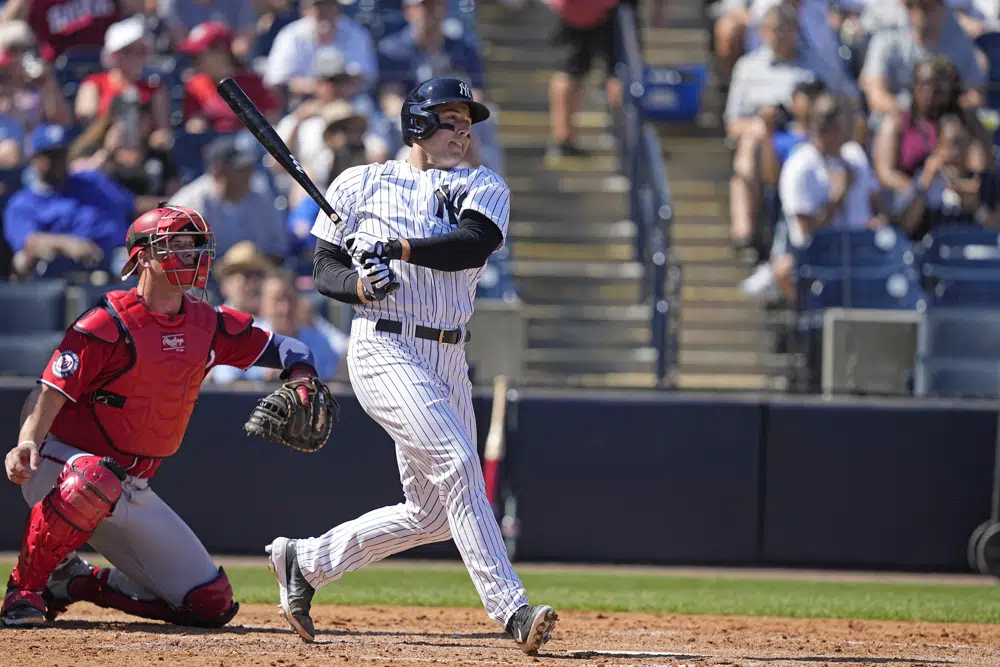
ST. PETERSBURG, Fla. (AP) — When Yankees switch-hitter Aaron Hicks batted from the left side last season, he was almost always greeted by an infield shift — a wall of defenders camped in shallow right field.
So it was a striking moment in New York’s dugout when Hicks — facing a traditional infield alignment — hit his first clean single to right field early this spring training.
“He probably hasn’t seen that hit in about eight years,” manager Aaron Boone said.
Hicks and the rest of baseball’s most frequently shifted batters are getting used to a new reality — or rather, adjusting back to an old one — after Major League Baseball passed rules limiting infield shifts ahead of this season.
So far, those limits seem to be raising batter spirits — and they might be bolstering batting averages, too.
“I really hope this isn’t the year I start hitting the ball to the shortstop on the ground,” Yankees left-handed slugger Anthony Rizzo said with a smile. “Especially young left-handed hitters will be introduced to the 3-4 hole that’s been gone for about seven to eight years.”
Teams must now keep two infielders on each side of second base, all with their feet in the dirt when a pitch is delivered. The aim is to open up space for a few more singles in each game after data-driven teams spent the past decade carefully crafting defensive formations that targeted each hitter’s tendencies.
It’s too early in spring training to draw conclusions from the numbers, but key statistics are trending in a promising direction for hitters. Batting averages through the first 10 days of spring training are up to .263 in 2023 from .259 last season.
Crucially, left-handed hitters — the most frequent targets of the modern infield shift — are hitting .274 this spring, up from .255, according to the Elias Sports Bureau. Righty averages have dropped from .262 to .255. Overall scoring is at 11.3 runs per game, up from 10.6.
There has been disagreement in the sport’s analytics community about how much impact the shift limits will have, but it does seems to be affecting hitters’ psyches, at least.
“Not getting thrown out from shallow right field on a line drive will be nice,” said Rizzo, shifted in 82.6% of his plate appearances last season.
Tampa Bay manager Kevin Cash said he has noticed some difference already this spring but expects more offense to come later as big league regulars play deeper into games.
“I think there’s been so many balls already this spring that if you look to if that happened last year, they were out. We had a defender there,” Cash said.
Umpires have broad discretion to enforce the league’s new guidelines, but some clubs are already testing how strict those rules are.
When lefty slugger Joey Gallo — shifted in 90% of his plate appearances last year — of the Minnesota Twins came to the plate in a game against the Boston Red Sox last week, Boston experimented with a loophole in the new rules, moving center fielder Adam Duvall to shallow right field and left fielder Raimel Tapia to center field.
That shift didn’t matter much as Gallo drew a walk, but such is the new reality in baseball as teams start searching for advantages to the rules in 2023.
Marlins first base coach Jon Jay, who had 840 singles among his 1,087 career hits, thinks the change could lead to more small ball.
“We’re seeing already ground balls going up the middle that, with the shift, were outs,” he said. “It’s definitely going to create more offense. I think the single is a big player right now. You’re seeing those 10-hoppers up the middle and those ‘rollover balls’ in the hole … those are hits again.”
Philadelphia Phillies left fielder Kyle Schwarber, who was shifted against 90.5% of the time in 2022, thinks the shift could help promote more contact, too.
“I punched out 200 times last year,” Schwarber said during Phillies spring camp. He had a career-high 200 strikeouts last season. “That’s not acceptable. If I can cut down on 50-75, that’s more balls in play. And without that wall (the shift) out there, there might be a few to squeeze through.”
